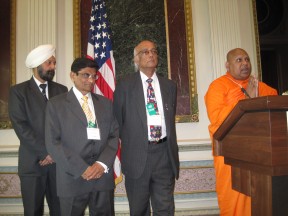Ven. Bhikkhu Bodhi
 Last week, on May 14th, I was privileged to be part of a group of Buddhist monastics, teachers, and leaders who converged on Washington DC for a conference on the role of Buddhism in the public square. The idea to convene such a conference originated with Bill Aiken, Public Affairs Officer for Soka Gakkai International–USA, who began to lay plans for the gathering as far back as December 2014. He established a steering committee, which eventually came to consist of Danny Hall (also of SGI), Professor Duncan Williams, Professor Sallie King, Matt Regan, Rev. T.K. Nakagaki, and myself. The list of invitees, originally set at 80, increased incrementally until it amounted to approximately 125, the maximum that could comfortably fit into the facilities provided. Representatives included monks, nuns, ministers, academics, yogis, lay Dharma teachers, and Buddhist activists from all traditions, with a balanced blend of Asian immigrant Buddhists and convert American Buddhists.
Last week, on May 14th, I was privileged to be part of a group of Buddhist monastics, teachers, and leaders who converged on Washington DC for a conference on the role of Buddhism in the public square. The idea to convene such a conference originated with Bill Aiken, Public Affairs Officer for Soka Gakkai International–USA, who began to lay plans for the gathering as far back as December 2014. He established a steering committee, which eventually came to consist of Danny Hall (also of SGI), Professor Duncan Williams, Professor Sallie King, Matt Regan, Rev. T.K. Nakagaki, and myself. The list of invitees, originally set at 80, increased incrementally until it amounted to approximately 125, the maximum that could comfortably fit into the facilities provided. Representatives included monks, nuns, ministers, academics, yogis, lay Dharma teachers, and Buddhist activists from all traditions, with a balanced blend of Asian immigrant Buddhists and convert American Buddhists.
The original goal of the event, as Bill Aiken conceived it, was to “to utilize the convening power of the White House to bring together a wide range of Buddhist community leaders to affirm our shared commitment to preventing climate change, sharing community best practices, and hearing from Obama administration representatives on issues of concern to us.” As preparations unfolded, two main points of focus emerged. One was climate change, which poses an ever-escalating threat to the security of human life on earth. The other, highlighted by the recent spate of police killings of unarmed people of color, has been the need for this country to finally implement full racial justice in all spheres of our communal life. Continue reading


